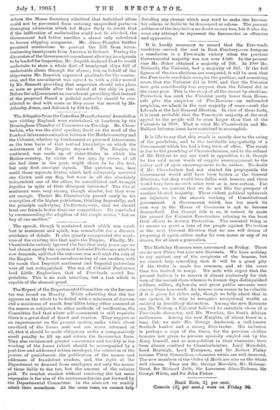The Birthday Honours were announced on Friday. There are no
new Peers, but nine new Baronets. We have nothing to say against any of the recipients of the honour, but we cannot help remarking that it will be a great pity if the Order is made too common, and at the same time too limited to range. We note with regret that the present fashion is to reserve it almost exclusively for rich men of the second class, whereas in former days distinguished soldiers, sailors, diplomats, and great public servants were among those honoured. An honour soon ceases to be valuable if it is given for riches only, though we fully admit that in our system it is wise to recognise exceptional wealth as entitled to hereditary distinction. Among the new Baronets are Mr. Tritton, a Unionist believed to entertain views of a Free-trade character, and Mr. Wernher, the South African millionaire. Among the new Knights, of whom there is a long list, we note Mr. George Anderson, a 'well-known Scottish banker and a strong Free-trader. His inclusion is perhaps a sign of the times, for the previous civilian honours not given to persons specially singled out by the King himself, and so non-political in their character, have been almost confined to Chamberlainites. Lord Mansfield, Lord Rayleigh, Lord Tennyson, and Sir Robert Finlay become Privy Councillors,—honours which are well deserved. The new members of the Order of Merit are also on the whole well chosen. They are Mr. George Mered.ith, Mr. Holman- Hunt, Sir Richard Jebb, Sir Lawrence Alma-Tadema, Sir George White, and Sir John Fisher.
Bank Rate, 21 per cent.
Consols (21 per cent.) were on Friday 90.










































 Previous page
Previous page